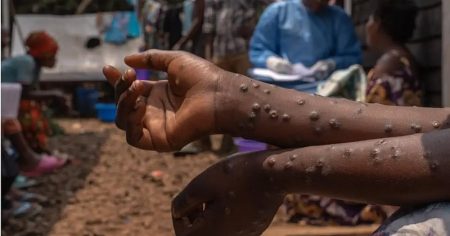Mpox Outbreak in Western North Region of Ghana: A Comprehensive Overview
The Western North Region of Ghana is grappling with an outbreak of Mpox, a zoonotic disease caused by the monkeypox virus. As of August 27, 2025, the region has reported a total of 162 suspected cases and 37 confirmed cases, spanning five out of its nine districts. The distribution of confirmed cases reveals a concentration in specific areas: Bibiani Anwhiaso Bekwai Municipality leads with 16 cases, followed by Aowin Municipality with 15 cases, and Wiawso Municipality with 4 cases. Akontombra and Bia West Districts each reported a single confirmed case. This localized pattern suggests potential transmission hotspots within the region, necessitating targeted interventions.
Health authorities in the Western North Region have initiated comprehensive measures to contain the Mpox outbreak and prevent further spread. A crucial aspect of their response is contact tracing, with 350 contacts identified and 317 of them completing the mandatory 21-day follow-up period. This process aims to monitor individuals exposed to confirmed Mpox cases for symptoms and provide timely medical support if needed. The completion of the follow-up cycle for a significant portion of contacts suggests effective implementation of surveillance strategies.
Public health education plays a pivotal role in raising awareness and promoting preventive behaviors. The Western North Regional Health Directorate has adopted a multi-pronged approach to disseminate Mpox information. This includes engaging with students in basic and senior high schools, conducting community-based awareness campaigns, utilizing information centers, and broadcasting messages through local radio stations. These initiatives aim to empower individuals with the knowledge needed to protect themselves and their communities from Mpox.
Screening for Mpox is another integral component of the regional response. Health facilities across the region are actively screening individuals presenting with symptoms suggestive of Mpox. Suspected cases are isolated until laboratory results confirm or rule out the presence of the virus. This measure is crucial to preventing the spread of Mpox within healthcare settings and across the wider community. Isolating suspected cases minimizes the risk of transmission while awaiting definitive diagnosis.
The Western North Regional Health Directorate emphasizes the importance of community collaboration in combatting the Mpox outbreak. Regional Research Officer, Mr. Saibu Adama, appealed to residents to actively participate in preventive efforts and support the health directorate’s initiatives. Collective action, involving both individuals and health authorities, is crucial for effectively controlling the outbreak and safeguarding public health. Community engagement fosters a sense of shared responsibility in addressing the health crisis.
The ongoing Mpox outbreak in the Western North Region underscores the need for continued vigilance and proactive measures. While the health directorate’s efforts in contact tracing, public education, screening, and case isolation are commendable, sustained vigilance is essential to monitor the situation, adapt strategies as needed, and ensure the outbreak remains contained. Community participation plays a vital role in supporting these efforts and promoting overall public health. Ultimately, a collaborative approach, involving health authorities, communities, and individuals, is essential for successfully navigating the Mpox challenge and protecting the well-being of the population in the Western North Region.














